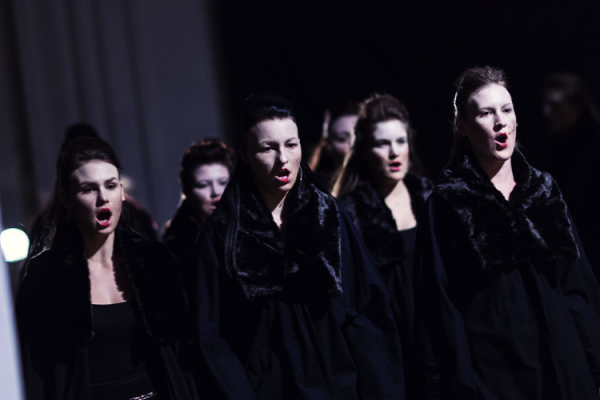Toxic Psalms

(© Uran Rudi)
"Tonight, the subject is love," a woman says in heavily accented English in the opening moments of Carmina Slovenica's Toxic Psalms, the choral theater work now making its American premiere at St. Ann's Warehouse as part of the Prototype Festival of experimental opera. The program note expands the definition of love, claiming, "Through music the project reflects Palestine, Syria, Pussy Riot, weapons, concentration camps, blood feuds, extinctions, contaminations of religions, and human brutality." That's quite a heavy load of love. Yet the Slovenian company and its director Karmina Šilec might be onto something with its improbable connection between love (of country, identity, tribe) and such terrible acts of group violence. While the material presented onstage never makes this connection entirely clear, Šilec presents her arcana with a heavy dose of beauty and wonder.
The curtain rises on 31 women with blanched faces and pulled-back hair. While all are clad in black, each dress is unique and detailed (remarkable costumes by Belinda Radulović), signifying a certain individuality within this ostensibly united front. They claw their way out from under a sheer cloth while intoning glorious straight harmonies, which occasionally stop on a dime to spine-tingling effect. The sound is medieval and ecclesiastical, yet distinctly modern. It often feels like peering into an avant-garde nunnery.
Carmina Slovenica calls its unique style of performance "Choregie," which is described as a "scenic adventure." The show is divided into eight tableaux with titles like "Individuum – Collectivum" and "Molto Adagio: Banality of Evil." These moments are set to an eclectic mix of found music and texts, ranging from the Syrian Orthodox traditional texts to Russian composer Sergei Rachmaninoff. All of the material is conveyed with commitment and precision from this highly skilled vocal ensemble.
In addition to making her cast sound extraordinary, director Šilec makes great use of the depth of St. Ann's Warehouse, having the cast emerge from the far-upstage shadows and bringing them face-to-face with the audience downstage. Lighting designer Andrej Hajdinjak helps create these moments, strategically lighting and darkening the cavernous space. Sound designer Danilo Ženko engineers the amplification so that it feels like being in one of the world's premiere opera houses.
Certainly, the grandiosity of the staging rivals what one might see at the Met. At one point, the cast marches in circles around the stage, three-by-three, crushing the helpless lemons that were earlier strewn across the floor. Such theatricalized fascism can only really be achieved with an enormous ensemble like the one in Toxic Psalms.
At its best, Toxic Psalms offers an overwhelming aural and visual experience, like when the cast faces upstage and sings into handheld mirrors. We can see each of their faces, we can hear them perfectly, and yet they are facing away. This moment is beautiful, disorienting, and highly unexpected.
Far too many times, however, the show lapses into self-parody: like when the actors pull out megaphones, point them at the front row, and turn the siren function on full-blast, causing many elderly patrons to clutch their ears in terror; or when a single actress mournfully peels a lemon while six dancers in flesh-colored unitards chant vaguely about "what he did to her." After the first half hour of this 90-minute event, the whole thing becomes tedious and predictable.
"Just peacefully fall asleep," the cast stage-whispers at the audience. This is an ill-advised suggestion to give patrons at an experimental opera and sadly, I saw several people taking them up on it.










